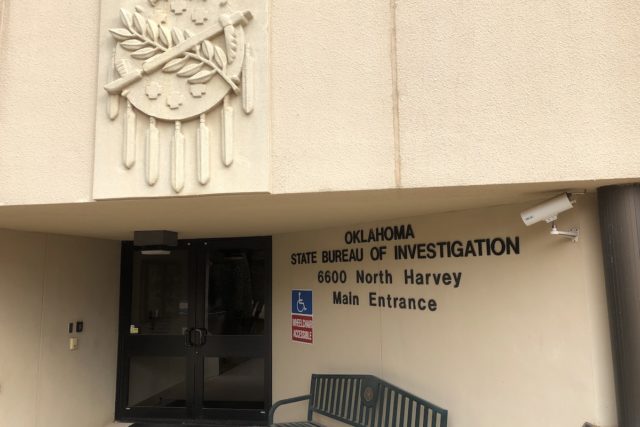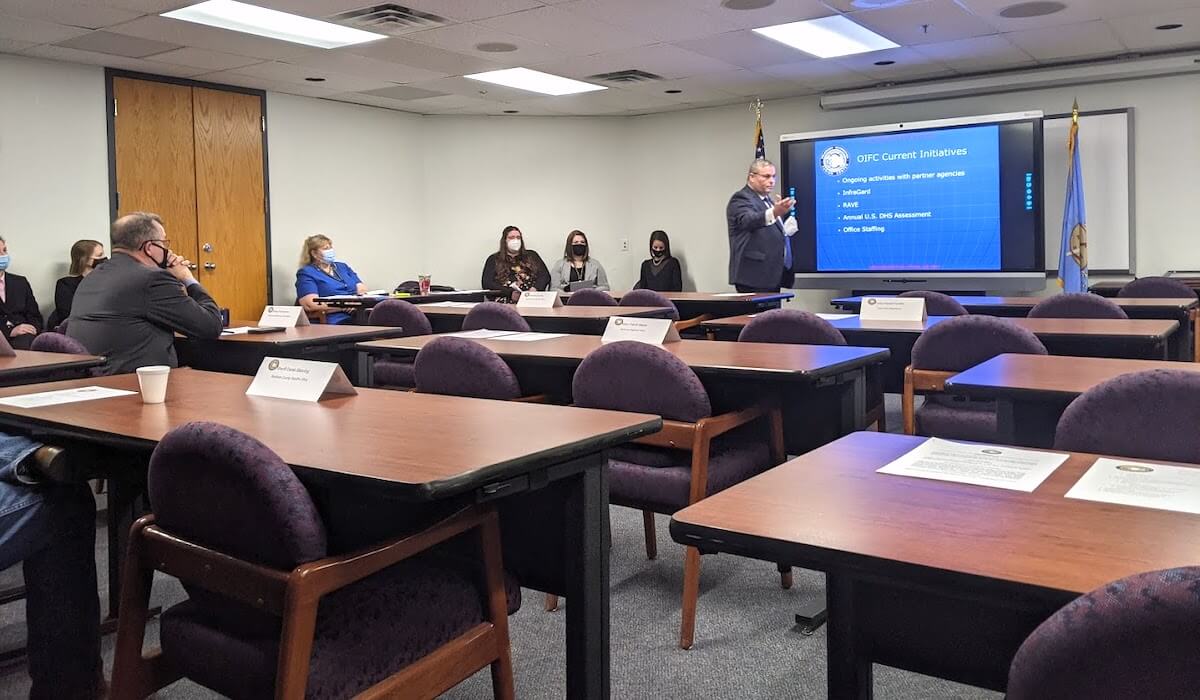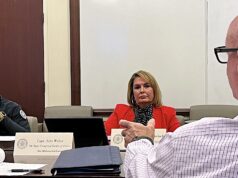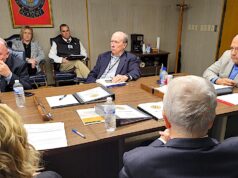

In an executive order signed this week, Gov. Kevin Stitt is moving oversight of a state intelligence task force from the Oklahoma State Bureau of Investigation to the Oklahoma Department of Public Safety.
The agencies have until March 1 to effectuate the transfer of documentation and operation, and it underscores ongoing tension between the governor and OSBI over the topic of state law enforcement unification, a concept that has been around for decades and that once again fell short of passing the Legislature during the 2022 session.
“Since taking office, the governor has advocated for and delivered on centralizing and consolidating state agencies to ensure the best services for Oklahoma taxpayers,” Kate Vesper, Stitt’s press secretary, said in a statement. “With the Oklahoma Fusion Center, the Department of Public Safety can help bridge the gap and share intelligence with law enforcement, therefore improving public safety for Oklahomans.”
Asked about the governor’s specific motivations, Vesper said moving the Fusion Center from OSBI to DPS is more about Stitt’s philosophy regarding unification of state law enforcement agencies than it is about a specific operational change for the information-coordination entity.
“This move is the next step in creating multi-agency information sharing that will be more proactive rather than reactive in public safety,” Vesper said. “That’s a big benefit to this change.”
But the new executive order has also reignited concerns about whether moving functions from OSBI to DPS might give Stitt — and future governors — undue influence over and access to information regarding criminal investigations. Specifically, OSBI and decisions about its director are governed by an independent commission, whereas the director of DPS can be hired and fired at will by the governor.
J.R. Kidney, the chairman of the Oklahoma Association of Chiefs of Police’s legislative committee, said most people are not panicked by the move, but that it bears watching.
“It does kind of scare us that now we go into an executive order that basically is removing part of OSBI and sending it over to DPS. Is this going to be the way that the consolidation goes, or is this a one-time deal?” Kidney said Thursday. “After talking to some of the other chiefs I spoke with yesterday, we don’t understand what was broken or what needed to be fixed to cause the governor to make that executive order.”
Asked for comment about Stitt’s executive order, OSBI director Aungela Spurlock stayed above the fray.
“We look forward to continued collaboration with our law enforcement partners in service of the citizens of Oklahoma and in support of the Oklahoma Information Fusion Center mission,” she said.
Questions of governance, independence
The Oklahoma Information Fusion Center was created in 2007 by Gov. Brad Henry. Dozens of similar entities around the country were instituted by the U.S. Department of Homeland Security in the wake of the 9/11 Commission Report “for the receipt, analysis, gathering, and sharing of threat-related information among federal, state, local, tribal, and territorial (SLTT) partners,” according to the DHS website.
The Fusion Center’s governing board, consisting of representatives from a bevy of state and local law enforcement agencies, typically meets in January, May and September.
In January 2021, NonDoc reported that too few members of the Fusion Center’s governing board attended the meeting to comprise a quorum. Additionally, the Fusion Center’s website had not been updated since 2017, and it listed a slate of inaccurate and out-of-date information. The center’s website was redesigned and updated before the end of 2021.
Kidney, who has worked for the Tecumseh Police Department since 1991 and became chief in 2018, said the Fusion Center sends alerts, updates and questions to law enforcement around the state, often on a daily basis.
“All of us who use the Fusion Center feel like it’s been run very well,” Kidney said. “We feel like the information flows very quickly, very adequately out of the OSBI.”
He said communications arrive via email and typically include BOLO — be on the lookout — notifications, information about national issues (such as the 2021 TikTok school shooting hoax trend), and coordination for high-profile events.
“When President Trump came to Tulsa, Oklahoma, you know, the Oklahoma Information Fusion Center (asked), ‘Does anybody have any known threat that is directly related to the incidence going on in Tulsa?'” Kidney said. “They are communicating constantly, and a lot of time that is on a daily basis.”
RELATED
Oklahoma Information Fusion Center a little-known hub of state law enforcement by Andrea DenHoed
Sen. Darrell Weaver (R-Moore) has served as the vice chairman of the Senate Public Safety Committee this year. Prior to joining the Legislature, Weaver led the Oklahoma Bureau of Narcotics and Dangerous Drugs for decades.
Asked about Stitt’s order moving the Fusion Center from OSBI to DPS, Weaver said initial concerns about which agency houses the apparatus may prove to be a little overblown.
“I’d heard that it may happen. To be brutally honest with you, that Fusion Center hasn’t been a huge thing in Oklahoma,” Weaver said. “Even back when I was running [OBNDD], we interacted with them some, but I just don’t have a real passion where it’s located.”
Weaver said that, in terms of the Fusion Center’s role assessing and disseminating information about potential terrorist threats, the Department of Public Safety is more likely to respond to those issues and has more direct contact with the Department of Homeland Security already.
“I agree with Sen. Weaver,” Kidney said. “That is true. There are probably more boots on the ground (at DPS). The OSBI doesn’t have the tact teams and swat teams. That’s all going to come out of DPS.”
But Kidney said a bigger question could involve any Oklahoma governor’s influence over DPS compared to his or her influence over OSBI.
“As the Oklahoma Association of Chiefs of Police Board, that has been a concern of ours. The governor has direct control over DPS, over the commissioner and all of that kind of stuff, whereas these other two agencies — OBNDD and OSBI — have their own council or board,” Kidney said. “There’s kind of that buffer in between. And I don’t think any of us are saying that we think there’s something corrupt going on or anything like that, but it opens that door to be more easily done without a board or something in place and the governor just having complete control over that.”
Kidney said past instances of political corruption in Oklahoma — including the 1975 arrest and bribery prosecution of outgoing Gov. David Hall — should make citizens remember why state law enforcement agencies were reformed to have independent governing boards.
“There was too much corruption, and that’s kind of why these other boards were formed to help stop that situations,” he said.
Weaver, who railed against Stitt’s proposal to “unify” OSBI and OBNDD under DPS last year, said his understanding of how the Fusion Center handles sensitive information should limit political influence.
“The Fusion Center has many barriers and regulations on who can access, and I believe there are still clearances for people involved in that,” Weaver said. “I don’t know that, even me as a retired director and someone who has been in that arena for decades and as a public safety guy in politics and the Senate, I don’t know that I can access that intelligence.”
Weaver said “strict” guidelines on how the Fusion Center handles information mean the entity’s agency location likely will not matter.
“It’s a pretty high-level,” Weaver said. “I don’t know that they have any ability to investigate political entities and stuff like that. I don’t think that’s their wheelhouse.”
Kidney emphasized that the Oklahoma Association of Chiefs of Police is not upset about the executive order. But lingering questions about Stitt’s desire to push unification of OSBI, OBNDD and DPS have been stoked by the move.
“If we’re going to consolidate, are we going to consolidate to save money? What are we consolidating for? That’s kind of one of the things we keep asking and want to know,” Kidney said.
Read the full executive order
https://nondoc.com/wp-content/uploads/2022/11/Oklahoma-Executive-Order-2022-31.pdf” viewer=”google”]




















